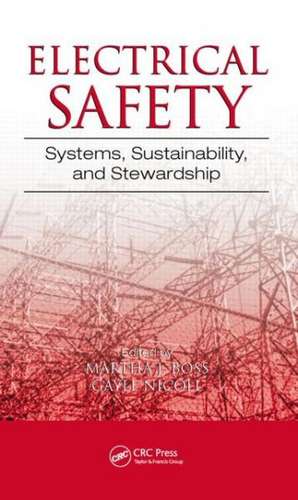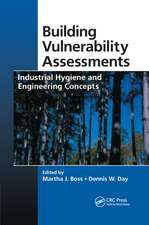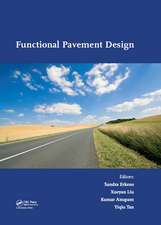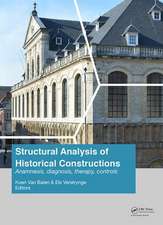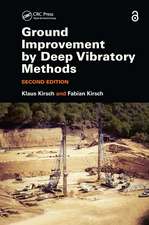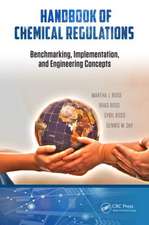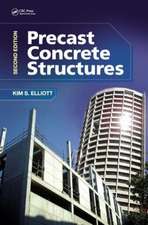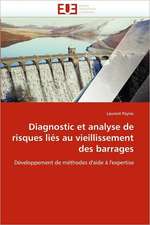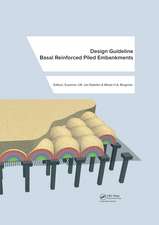Electrical Safety: Systems, Sustainability, and Stewardship
Editat de Martha J. Boss, Gayle Nicollen Limba Engleză Paperback – 29 oct 2014
A number of electrical fatalities and injuries that occur each year can be overcome by a thorough understanding of electrical concepts. Yet due to the complexity of regulatory requirements, many safety professionals may not be fully equipped to handle the task. Electrical Safety: Systems, Sustainability, and Stewardship addresses the problem by simplifying the knowledge acquisition process, and arming safety professionals with the tools needed to successfully meet safety and efficacy goals. From power generation facility to electrical device, this text combines knowledge of industry standards, regulations, and real-world experience to provide a detailed explanation of electrical power generation, transmittal, and use.
Explains the Concepts behind Electric Code
The book introduces the basic sustainability and stewardship concepts inherent to reliability centered maintenance (RCM). It explains how these concepts apply to the components of an electrical system (the concepts can be used when auditing for electrical safety, training on electrical safety, and overseeing an upgrade or extension of a building's electrical system). In addition, it addresses general electrical safety, electromagnetic field shields, ohm/resistance study criteria, arc flash hazard analysis, and hazardous energy control. The authors outline OSHA requirements and the reasons for those requirements, and explain the implementation exigencies.
This book:
- Describes power generation, transmittal, and usage
- Contains regulatory summaries from the OSHA electrical safety standards
- Presents the various types of electrical studies including arc flash, electromagnetic field, and ohm resistance investigations
- Discusses earthing grounds and overcurrent devices as overall components of electrical control and safety
- Offers an up-to-date discussions of arc flash criteria and evaluation needs that are linked to general electrical safety and grounding requirements
- Considers electromagnetic field physics, measurement, and control alternatives
Preț: 555.05 lei
Preț vechi: 742.42 lei
-25% Nou
Puncte Express: 833
Preț estimativ în valută:
106.22€ • 110.49$ • 87.69£
106.22€ • 110.49$ • 87.69£
Carte tipărită la comandă
Livrare economică 14-28 aprilie
Preluare comenzi: 021 569.72.76
Specificații
ISBN-13: 9781482230178
ISBN-10: 1482230178
Pagini: 416
Ilustrații: 9 black & white illustrations, 39 black & white tables
Dimensiuni: 156 x 234 x 23 mm
Greutate: 0.59 kg
Ediția:1
Editura: CRC Press
Colecția CRC Press
ISBN-10: 1482230178
Pagini: 416
Ilustrații: 9 black & white illustrations, 39 black & white tables
Dimensiuni: 156 x 234 x 23 mm
Greutate: 0.59 kg
Ediția:1
Editura: CRC Press
Colecția CRC Press
Cuprins
Electrical Sustainability and Stewardship. Electrical Components. Transformers. Generators. Circuit Breakers. Relays. Fuses. Substations and Switchyards. Direct Current Utilization. Circuit Disconnects, On/Off Switches, and OSHA. Grounding. Electrical Safety and OSHA. Special Installations and OSHA. Distance Requirements and OSHA. Arc Flash, Personal Protective Equipment, and Classified Locations. Electrical Testing. Electromagnetic Shielded Equipment, Instrumentation, and Facilities, Part One. Electromagnetic Shielded Equipment, Instrumentation, and Facilities, Part Two. Solid-State Technology. Motors. Hazardous Energy Control and OSHA. Glossary. Bibliography. Appendix RCM Evaluation Tables. Index.
Notă biografică
Martha J. Boss has led teams in the inspection, analysis, and risk management of electrical safety components, including electromagnetic field (EMF) analyses. Boss earned her BS and BA degrees from the University of Nebraska and the University of Northern Iowa in biology, with a chemistry and physics emphasis. She edited and contributed to Building Vulnerability Assessments, Biological Risk Engineering Handbook, and Air Sampling and Industrial Hygiene Engineering (CRC Press). Martha is also the co-author of Evaluation of Stored Energy Hazards in Underground Coal Mines during and after an Emergency, provided to the National Institute of Occupational Health (NIOSH).
Gayle Nicoll has extensive experience in a variety of environmental, health, and safety (EHS) endeavors, including industrial facilities, nuclear research facilities, chemical laboratories, and metal-working facilities. She holds BS degrees in physics and chemistry from Indiana University, a MS in analytical chemistry from Purdue University, and a PhD in chemistry education from Purdue University. She was a contributor to Building Vulnerability Assessments (CRC Press) and co-author of the Evaluation of Stored Energy Hazards in Underground Coal Mines during and after an Emergency, provided to the National Institute of Occupational Health (NIOSH).
Gayle Nicoll has extensive experience in a variety of environmental, health, and safety (EHS) endeavors, including industrial facilities, nuclear research facilities, chemical laboratories, and metal-working facilities. She holds BS degrees in physics and chemistry from Indiana University, a MS in analytical chemistry from Purdue University, and a PhD in chemistry education from Purdue University. She was a contributor to Building Vulnerability Assessments (CRC Press) and co-author of the Evaluation of Stored Energy Hazards in Underground Coal Mines during and after an Emergency, provided to the National Institute of Occupational Health (NIOSH).
Recenzii
"I found this book to be well outlined for a quick reference of topics on electrical safety. ... I would be glad to have this on my bookshelf."
—Frank Pfeifer, CSP, CHMM
—Frank Pfeifer, CSP, CHMM
Descriere
While many safety professionals attempt to use electrical safety regulations, they may not understand the basis for the regulations and thus may not implement the regulations correctly. This is not surprising due to the complex wording of most regulations. This book presents a detailed description of the components of an electrical system. It explains the basis for the electrical safety regulations and identifies key safety items. It also covers how the electrical concepts apply to all major components of an electrical system within a facility.
